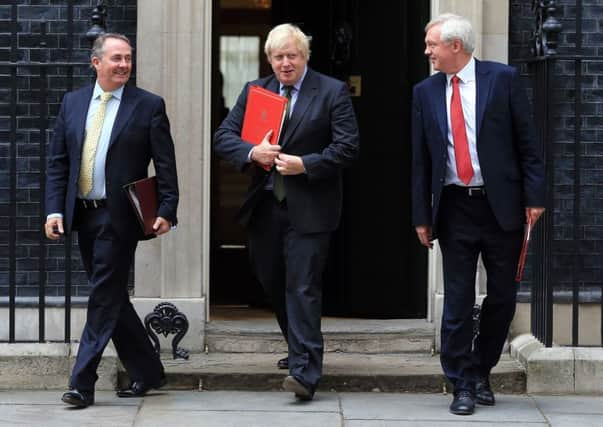Andrew Vine: We need a Brexit plan now to keep employers in UK


Like members of the House of Lords yesterday, the influential Foreign Affairs Select Committee will – again – ask him what the implications of Britain leaving the EU will be.
Spare a thought for Mr Davis, the MP for Haltemprice and Howden. He could hardly be faced with a trickier question if the committee’s members took it into their heads to ask him to explain the meaning of life.
Advertisement
Hide AdAdvertisement
Hide AdAnd the chances are that if the same question was put to his two fellow Brexit ministers, Foreign Secretary Boris Johnson and International Trade Secretary Liam Fox, as they left last week’s Cabinet meeting with Mr Davis, their answers might well be different from his.
That is because the only sure thing about Brexit remains its uncertainty.
We don’t yet know what it will mean for trade or immigration, not because the Government is failing to tell us, but because it doesn’t appear to know itself.
In the EU single market or out of it? Total power over immigration or merely “some control”? Questions like these remain anybody’s guess, and the longer they go unanswered, the more potentially toxic they become.
Advertisement
Hide AdAdvertisement
Hide AdThe term “Brexit means Brexit”, which might well become as familiar a catchphrase for Theresa May as “No, no, no” was for Margaret Thatcher or “No more boom and bust” was for Gordon Brown, doesn’t help at all. It’s a purposeful-sounding soundbite that’s supposed to suggest a clear direction of travel, when it is actually – like most soundbites – devoid of substance.
The meaning of Brexit remains elusive, and unless the Government starts to formulate some specifics sooner rather than later, trouble lies ahead.
Britain has had a fair wind in her sails since the vote to leave the EU in June. The doom-mongers who predicted economic meltdown have thankfully been proved wrong.
But the first stirrings of some potentially buffeting headwinds were felt at last week’s G20 summit in China.
Advertisement
Hide AdAdvertisement
Hide AdThe lukewarm tone on a trade deal with the United States taken by Barack Obama was disappointing, but since he will soon be gone from office, the warning from Japan that investment could be withdrawn was a much greater cause for concern. Just how damaging that could be struck me forcefully when visiting family in Sunderland, where I drove past the vast Nissan car plant.
Talk to anybody who lives there, and it quickly becomes clear that the Japanese industrial giant is the foundation on which the economy of the area is built.
Besides the people it employs directly, many of the other companies in the area, ranging from engineering to electrical contractors, essentially exist only to serve it as part of the supply chain.
Nissan puts the food on Sunderland’s tables. It is a popular employer which has created a huge amount of good, and the people of the city think of the company as their own.
Advertisement
Hide AdAdvertisement
Hide AdIf it decided to quit Britain, it would be a disaster for Sunderland, and a bitter irony for its people, who delivered one of the most emphatic votes of the EU referendum, voting leave by 61 per cent to 38 per cent.
Mrs May and Mr Davis will be acutely conscious of the need to prevent that. Striking a trade deal with Japan is likely to be very near the top of their agenda.
The Prime Minister’s statement to the Commons on the G20 was in keeping with what is emerging as her preferred way of conducting the business of Government – a careful weighing of the evidence and scrutiny of detail before decisions are made.
That is a sensible approach, and far preferable to rushing into the unknown by triggering the formal procedure to leave the EU, however much siren voices on the political right would like that to happen.
Advertisement
Hide AdAdvertisement
Hide AdBut the line between being methodical and appearing not to be moving quickly enough is a fine one. Governments around the world do not like uncertainty any more than international corporations such as Nissan. That is why most other countries would have preferred Britain to remain in the EU.
It became uncomfortably clear in the hours after the referendum result that neither the leave camp nor the Government had a plan for what happened if Britain voted to opt out.
Vagueness has been the only thing on offer since then, but that won’t do for much longer. Repeating “Brexit means Brexit” is already prompting in the minds of many the rejoinder, “Brexit means what, exactly?”
Whatever replies Mr Davis comes up with later today are only likely to prompt further questions.
For Britain’s sake, the Government needs to provide some definitive replies soon, not just for the electorate at home, but for decision-makers abroad.